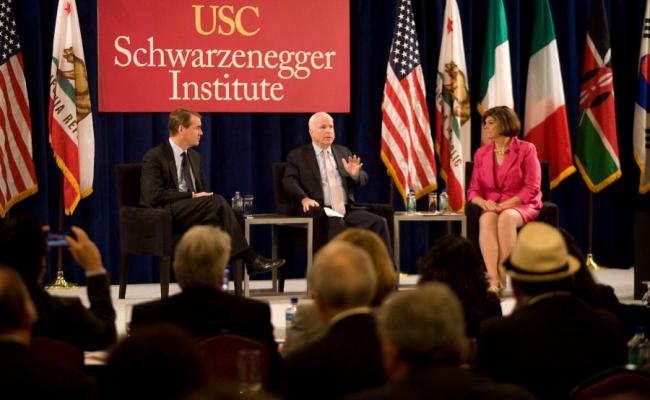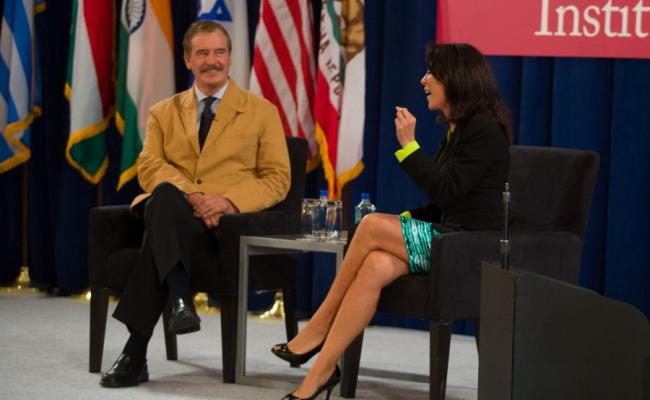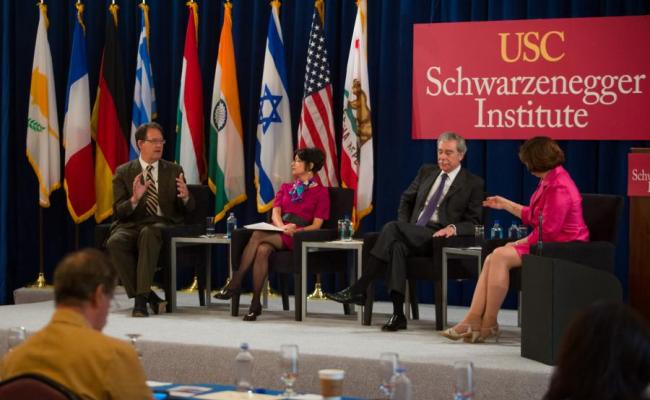After hosting a bipartisan forum on climate change earlier this month, the USC Schwarzenegger Institute turned to the importance of immigration reform Tuesday morning and partnered with the USC Price School to produce a forum on the historic opportunity to pass comprehensive immigration legislation. Held at Town and Gown on the campus of the University of Southern California for a full auditorium and broadcast via live stream online, the event brought together some of immigration reform’s most prominent advocates to discuss the critical importance of reform.
The forum, which was also attended by General Consuls from Germany, England, and Mexico, attracted the attention of the national media and the student body. Within two hours of the invitation’s distribution, student attendance for the forum reached maximum capacity. Within a day, the waitlist had grown to over 500 names.
In an editorial for Politico published the morning of the forum, Governor Schwarzenegger, the host of the event, wrote about the need for comprehensive reform from his perspective as an immigrant to the United States 45 years ago.
“As an immigrant and as the former governor of California, I feel very, very strongly that this country must address our broken immigration system,” he said. “Yes, it’s a debate about national security and economics — but even more, this is a conversation about what our country means to us, and what we want it to mean to others.”
In his introductory remarks, Governor Schwarzenegger spoke about the two founding principles of the Schwarzenegger Institute, and the influence of those principles in hosting the forum.
“Number one: the best policies are written in the absence of fear,” he said. “Number two: no ideology has a monopoly on solutions.”
The forum’s agenda demonstrated a commitment to those principles.
Following Governor Schwarzenegger’s remarks, Senator John McCain (R-AZ) and Senator Michael Bennet (D-CO), two of the eight co-authors of the bi-partisan immigration reform bill, took part in a conversation moderated by ABC News Radio reporter Ann Compton on “the legislative path to comprehensive immigration reform.” Senators Bennet and McCain came to the forum from different sides of the aisle, but stood together on the need for immigration reform.
Giuseppe Robalino, a freshman majoring in business, said the display of bipartisanship to produce the legislation gave him greater confidence in the American political system.
“Our constitution intended for the governance process to be slow, but not ineffective,” he said. “The Gang of 8 has given us renewed faith in Congress that it can still be effective.”
After a period of student questions, former Congresswoman and current USC Trustee Jane Harmon introduced the second panel of the afternoon. Also moderated by Compton, the panel featured former Commerce Secretary and Chairman of Republicans for Immigration Reform Carlos Gutierrez and USC Professors Dowell Myers and Pierrette Hondagneu-Sotelo. The panel discussed the pressing need for reform from both a demographic and economic standpoint, stressing the aging workforce and economic competitiveness as primary motivators to action.
“If we get this right, no one is going to catch up to us in the 21st century,” Secretary Gutierrez said.
Los Angeles Mayor Antonio Villaraigosa also attended the forum, and spoke about the importance of compromise in the legislative process. Praising the ability of the gang of 8 to “not let the perfect be the enemy of the good,” Villaraigosa discussed the importance of immigration reform to the economy and vitality of Los Angeles.
The forum concluded with a discussion between former president of Mexico Vicente Fox and Gabriela Teissier, News Anchor for Univision. President Fox offered his unique and global perspective on immigration reform and was also given the chance to respond to questions from the student body. Andres Engels, a freshman majoring in industrial and systems engineering, said the perspective provided by President Fox held special significance for him as a student born and raised in Mexico.
“Any immigration reforms would certainly affect me,” he said. “Changing visa policy, for example, would allow me to work in the US without less trouble after I graduate.”
Axel Hellman, a freshman majoring in policy, planning, and development, said the opportunity for students to ask questions not only gave them a valuable learning experience but also demonstrated the intellectual vitality of USC’s student body.
“By giving so much time for student questions the event definitely showcased the caliber of students that come to USC,” he said. “I thought it was very good of the Schwarzenegger Institute to treat the students as the audience instead of just the media.”
An essential goal of the forum was to inspire students to take action and add their voice to the growing conversation surrounding comprehensive immigration reform, a voice that would help bring more hard working students to live and study in the United States. For the audience of students, many who aspire to be future leaders, Secretary Gutierrez explained that today’s immigrants will be tomorrow’s leaders.
“The children of those workers are going to go to school and become doctor’s and lawyers—they may start at the bottom, but their children and grandchildren will be contributors and key leaders in society,” he said.
At an event hosted by Governor Schwarzenegger, an immigrant from Austria, Secretary Gutierrez could not have been more correct.
Nathaniel Haas is a freshman majoring in political science and economics at the University of Southern California.



